Exploring Sustainability, Wine Labelling, and Sober Curious Movement
VerifiedAdded on 2023/06/18
|12
|4066
|167
Essay
AI Summary
This essay provides a detailed analysis of current issues in wine tourism, with a specific focus on sustainability, wine labeling, the sober curious movement, and the impact of climate change. It examines how wine tourism contributes to tourism growth and revenue generation, highlighting both new and old world wine regions and different types of wine tourists. The essay discusses the importance of sustainability in wine tourism, including strategies for enhancing profitability while addressing changing customer preferences and government regulations. It also explores the influence of the sober curious movement on the wine industry and the increasing focus on sustainable wine tours, emphasizing the need for wineries to adopt sustainable practices and provide accurate information to consumers. Virtual wine tourism is also touched upon as a growing trend. The essay concludes by underscoring the significance of sustainability for the future growth and success of the wine tourism industry.
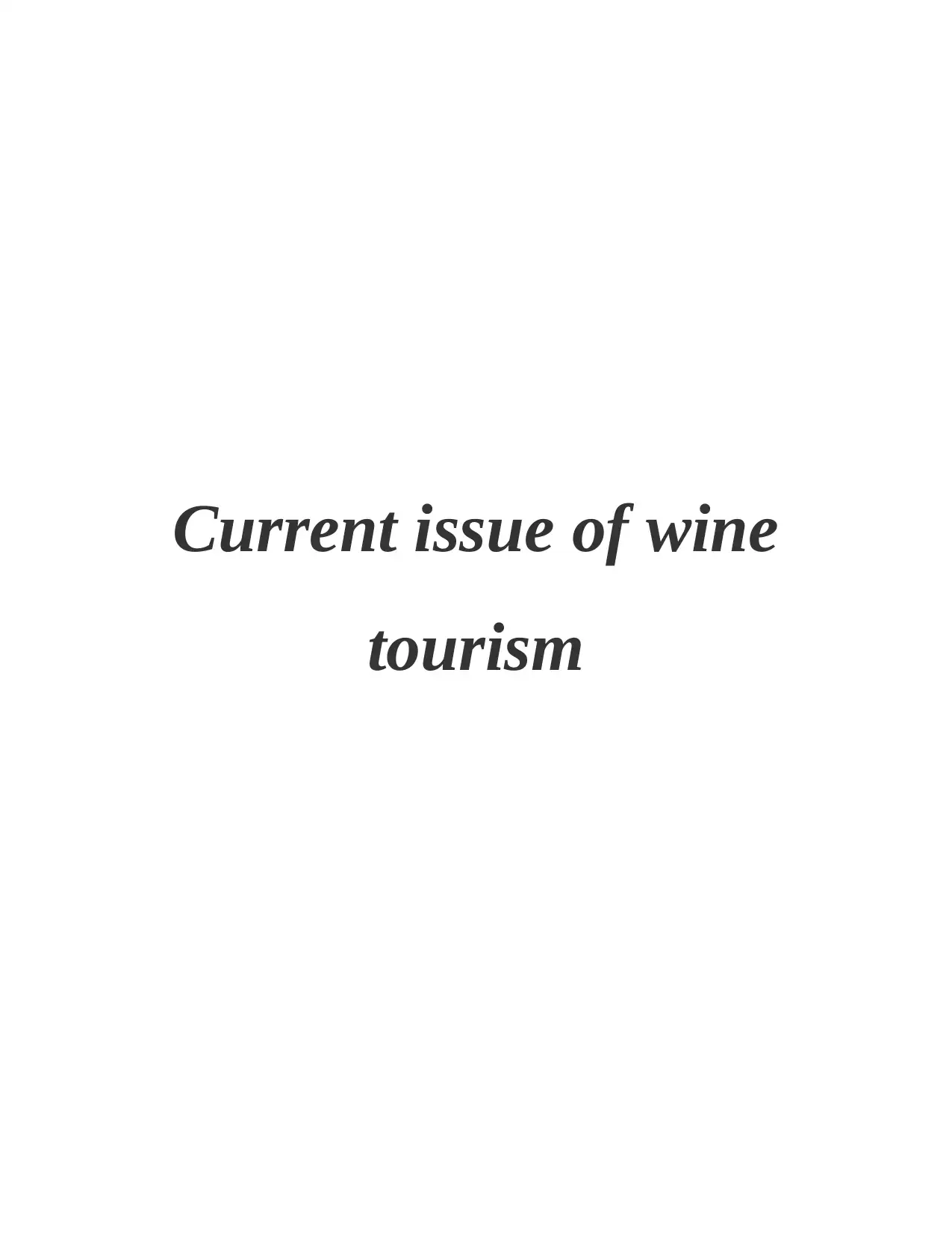
Current issue of wine
tourism
tourism
Paraphrase This Document
Need a fresh take? Get an instant paraphrase of this document with our AI Paraphraser
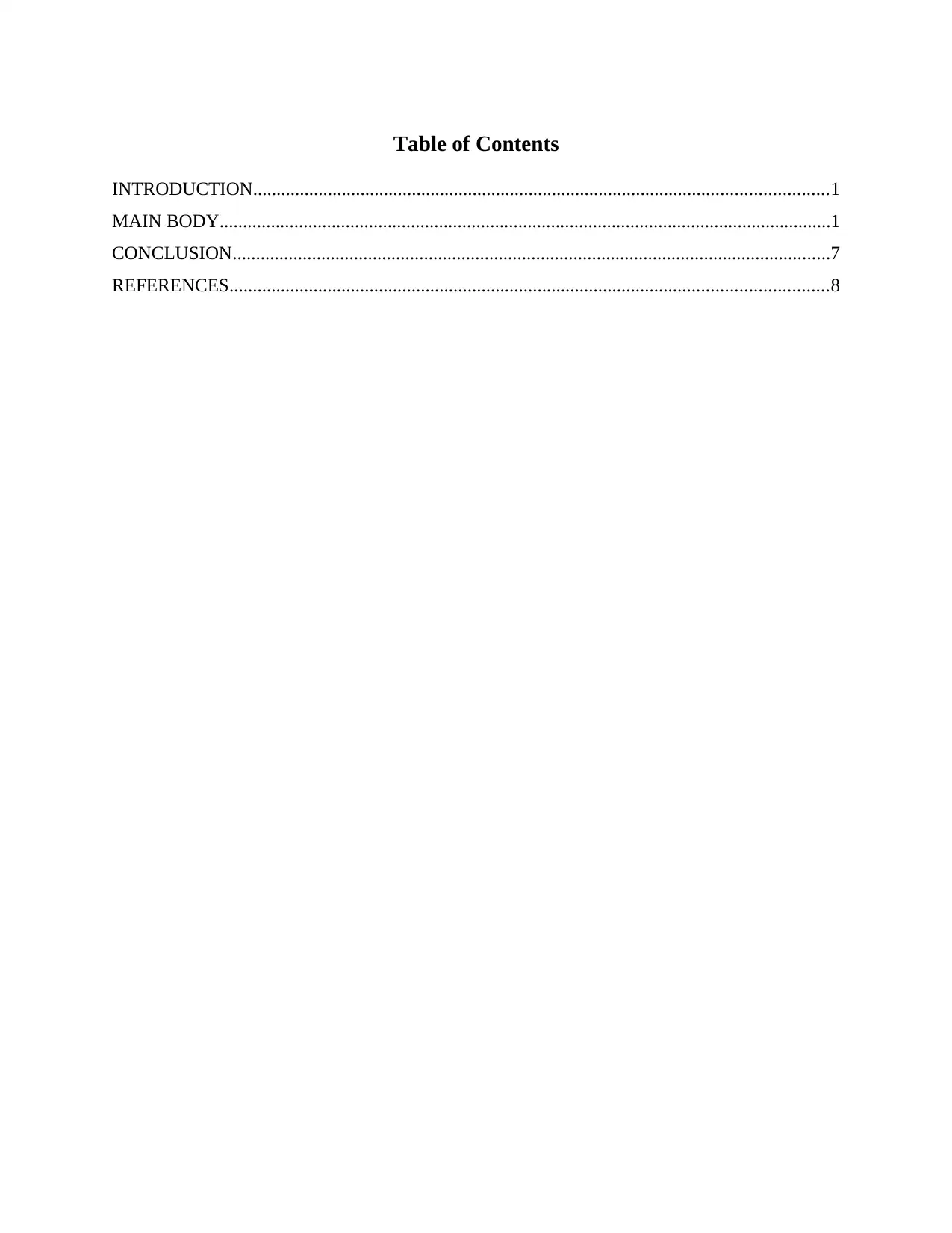
Table of Contents
INTRODUCTION...........................................................................................................................1
MAIN BODY...................................................................................................................................1
CONCLUSION................................................................................................................................7
REFERENCES................................................................................................................................8
INTRODUCTION...........................................................................................................................1
MAIN BODY...................................................................................................................................1
CONCLUSION................................................................................................................................7
REFERENCES................................................................................................................................8
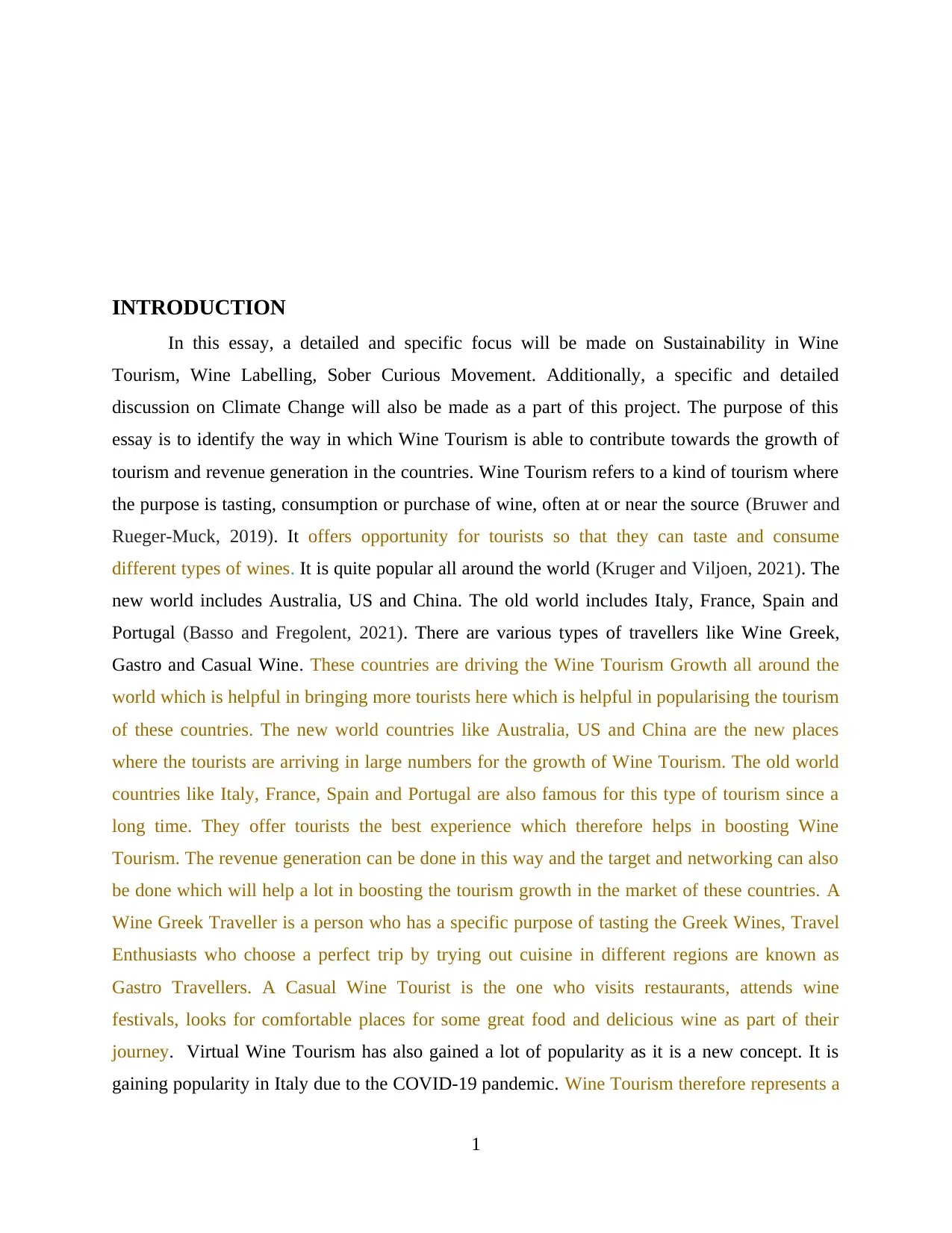
INTRODUCTION
In this essay, a detailed and specific focus will be made on Sustainability in Wine
Tourism, Wine Labelling, Sober Curious Movement. Additionally, a specific and detailed
discussion on Climate Change will also be made as a part of this project. The purpose of this
essay is to identify the way in which Wine Tourism is able to contribute towards the growth of
tourism and revenue generation in the countries. Wine Tourism refers to a kind of tourism where
the purpose is tasting, consumption or purchase of wine, often at or near the source (Bruwer and
Rueger-Muck, 2019). It offers opportunity for tourists so that they can taste and consume
different types of wines. It is quite popular all around the world (Kruger and Viljoen, 2021). The
new world includes Australia, US and China. The old world includes Italy, France, Spain and
Portugal (Basso and Fregolent, 2021). There are various types of travellers like Wine Greek,
Gastro and Casual Wine. These countries are driving the Wine Tourism Growth all around the
world which is helpful in bringing more tourists here which is helpful in popularising the tourism
of these countries. The new world countries like Australia, US and China are the new places
where the tourists are arriving in large numbers for the growth of Wine Tourism. The old world
countries like Italy, France, Spain and Portugal are also famous for this type of tourism since a
long time. They offer tourists the best experience which therefore helps in boosting Wine
Tourism. The revenue generation can be done in this way and the target and networking can also
be done which will help a lot in boosting the tourism growth in the market of these countries. A
Wine Greek Traveller is a person who has a specific purpose of tasting the Greek Wines, Travel
Enthusiasts who choose a perfect trip by trying out cuisine in different regions are known as
Gastro Travellers. A Casual Wine Tourist is the one who visits restaurants, attends wine
festivals, looks for comfortable places for some great food and delicious wine as part of their
journey. Virtual Wine Tourism has also gained a lot of popularity as it is a new concept. It is
gaining popularity in Italy due to the COVID-19 pandemic. Wine Tourism therefore represents a
1
In this essay, a detailed and specific focus will be made on Sustainability in Wine
Tourism, Wine Labelling, Sober Curious Movement. Additionally, a specific and detailed
discussion on Climate Change will also be made as a part of this project. The purpose of this
essay is to identify the way in which Wine Tourism is able to contribute towards the growth of
tourism and revenue generation in the countries. Wine Tourism refers to a kind of tourism where
the purpose is tasting, consumption or purchase of wine, often at or near the source (Bruwer and
Rueger-Muck, 2019). It offers opportunity for tourists so that they can taste and consume
different types of wines. It is quite popular all around the world (Kruger and Viljoen, 2021). The
new world includes Australia, US and China. The old world includes Italy, France, Spain and
Portugal (Basso and Fregolent, 2021). There are various types of travellers like Wine Greek,
Gastro and Casual Wine. These countries are driving the Wine Tourism Growth all around the
world which is helpful in bringing more tourists here which is helpful in popularising the tourism
of these countries. The new world countries like Australia, US and China are the new places
where the tourists are arriving in large numbers for the growth of Wine Tourism. The old world
countries like Italy, France, Spain and Portugal are also famous for this type of tourism since a
long time. They offer tourists the best experience which therefore helps in boosting Wine
Tourism. The revenue generation can be done in this way and the target and networking can also
be done which will help a lot in boosting the tourism growth in the market of these countries. A
Wine Greek Traveller is a person who has a specific purpose of tasting the Greek Wines, Travel
Enthusiasts who choose a perfect trip by trying out cuisine in different regions are known as
Gastro Travellers. A Casual Wine Tourist is the one who visits restaurants, attends wine
festivals, looks for comfortable places for some great food and delicious wine as part of their
journey. Virtual Wine Tourism has also gained a lot of popularity as it is a new concept. It is
gaining popularity in Italy due to the COVID-19 pandemic. Wine Tourism therefore represents a
1
⊘ This is a preview!⊘
Do you want full access?
Subscribe today to unlock all pages.

Trusted by 1+ million students worldwide
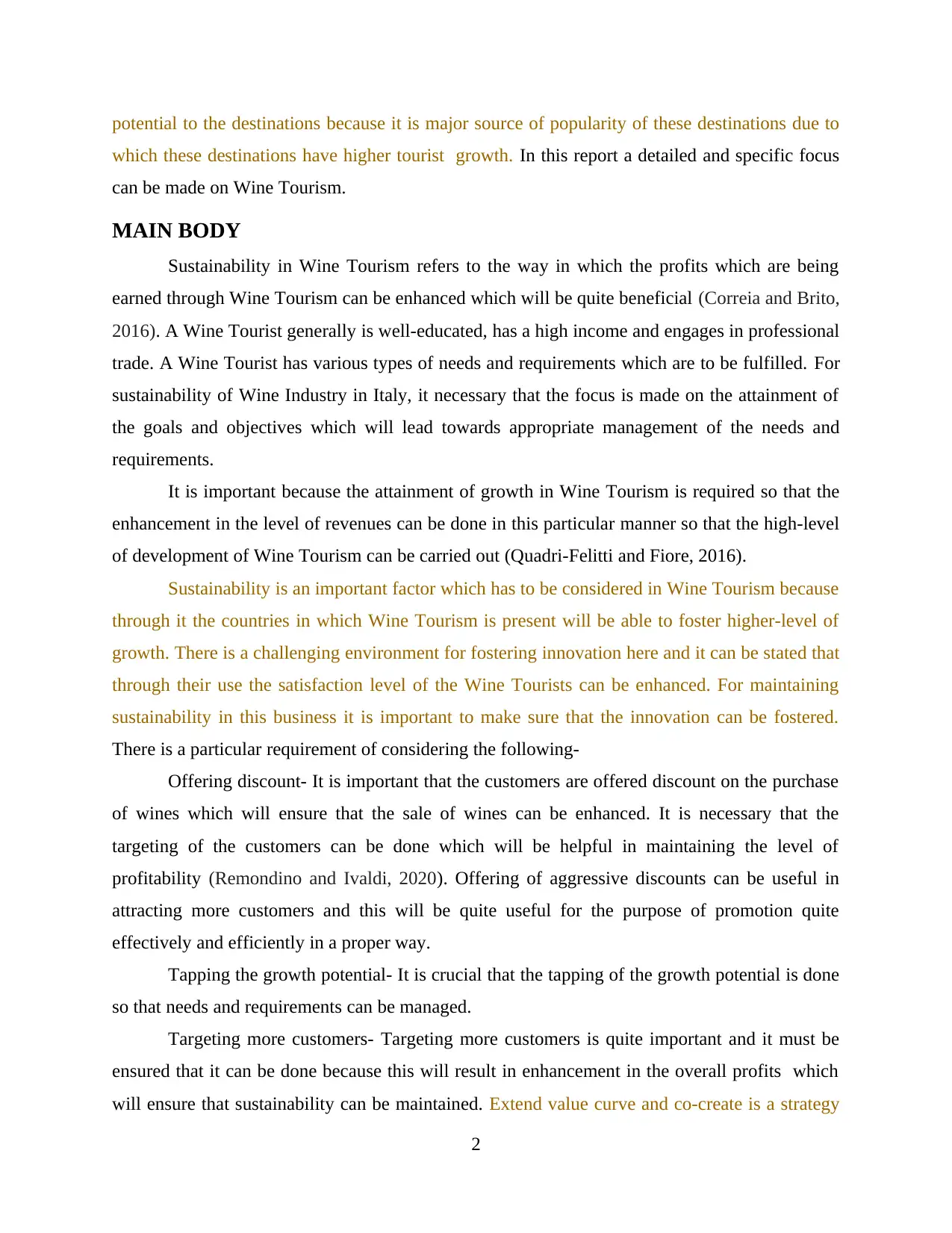
potential to the destinations because it is major source of popularity of these destinations due to
which these destinations have higher tourist growth. In this report a detailed and specific focus
can be made on Wine Tourism.
MAIN BODY
Sustainability in Wine Tourism refers to the way in which the profits which are being
earned through Wine Tourism can be enhanced which will be quite beneficial (Correia and Brito,
2016). A Wine Tourist generally is well-educated, has a high income and engages in professional
trade. A Wine Tourist has various types of needs and requirements which are to be fulfilled. For
sustainability of Wine Industry in Italy, it necessary that the focus is made on the attainment of
the goals and objectives which will lead towards appropriate management of the needs and
requirements.
It is important because the attainment of growth in Wine Tourism is required so that the
enhancement in the level of revenues can be done in this particular manner so that the high-level
of development of Wine Tourism can be carried out (Quadri-Felitti and Fiore, 2016).
Sustainability is an important factor which has to be considered in Wine Tourism because
through it the countries in which Wine Tourism is present will be able to foster higher-level of
growth. There is a challenging environment for fostering innovation here and it can be stated that
through their use the satisfaction level of the Wine Tourists can be enhanced. For maintaining
sustainability in this business it is important to make sure that the innovation can be fostered.
There is a particular requirement of considering the following-
Offering discount- It is important that the customers are offered discount on the purchase
of wines which will ensure that the sale of wines can be enhanced. It is necessary that the
targeting of the customers can be done which will be helpful in maintaining the level of
profitability (Remondino and Ivaldi, 2020). Offering of aggressive discounts can be useful in
attracting more customers and this will be quite useful for the purpose of promotion quite
effectively and efficiently in a proper way.
Tapping the growth potential- It is crucial that the tapping of the growth potential is done
so that needs and requirements can be managed.
Targeting more customers- Targeting more customers is quite important and it must be
ensured that it can be done because this will result in enhancement in the overall profits which
will ensure that sustainability can be maintained. Extend value curve and co-create is a strategy
2
which these destinations have higher tourist growth. In this report a detailed and specific focus
can be made on Wine Tourism.
MAIN BODY
Sustainability in Wine Tourism refers to the way in which the profits which are being
earned through Wine Tourism can be enhanced which will be quite beneficial (Correia and Brito,
2016). A Wine Tourist generally is well-educated, has a high income and engages in professional
trade. A Wine Tourist has various types of needs and requirements which are to be fulfilled. For
sustainability of Wine Industry in Italy, it necessary that the focus is made on the attainment of
the goals and objectives which will lead towards appropriate management of the needs and
requirements.
It is important because the attainment of growth in Wine Tourism is required so that the
enhancement in the level of revenues can be done in this particular manner so that the high-level
of development of Wine Tourism can be carried out (Quadri-Felitti and Fiore, 2016).
Sustainability is an important factor which has to be considered in Wine Tourism because
through it the countries in which Wine Tourism is present will be able to foster higher-level of
growth. There is a challenging environment for fostering innovation here and it can be stated that
through their use the satisfaction level of the Wine Tourists can be enhanced. For maintaining
sustainability in this business it is important to make sure that the innovation can be fostered.
There is a particular requirement of considering the following-
Offering discount- It is important that the customers are offered discount on the purchase
of wines which will ensure that the sale of wines can be enhanced. It is necessary that the
targeting of the customers can be done which will be helpful in maintaining the level of
profitability (Remondino and Ivaldi, 2020). Offering of aggressive discounts can be useful in
attracting more customers and this will be quite useful for the purpose of promotion quite
effectively and efficiently in a proper way.
Tapping the growth potential- It is crucial that the tapping of the growth potential is done
so that needs and requirements can be managed.
Targeting more customers- Targeting more customers is quite important and it must be
ensured that it can be done because this will result in enhancement in the overall profits which
will ensure that sustainability can be maintained. Extend value curve and co-create is a strategy
2
Paraphrase This Document
Need a fresh take? Get an instant paraphrase of this document with our AI Paraphraser
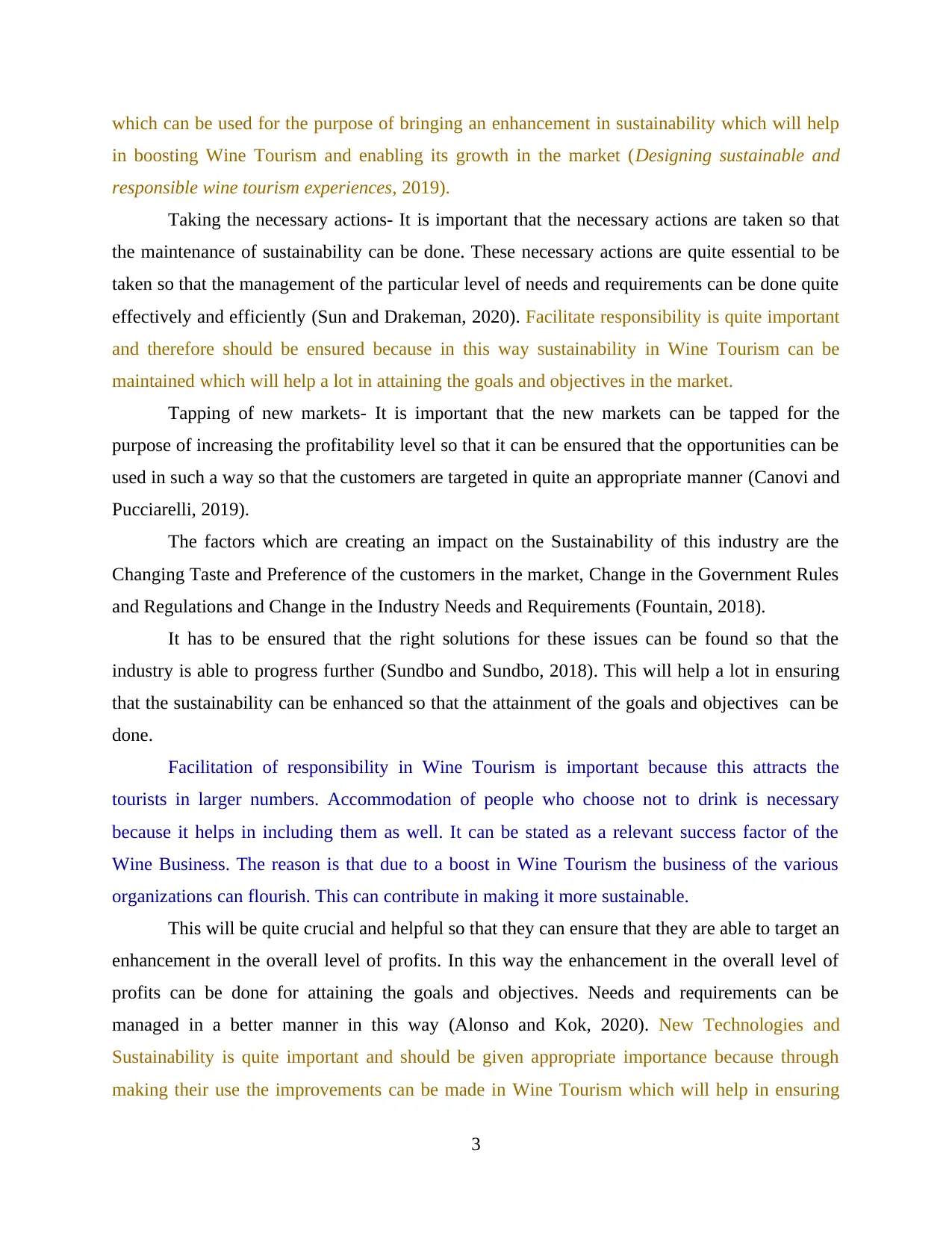
which can be used for the purpose of bringing an enhancement in sustainability which will help
in boosting Wine Tourism and enabling its growth in the market (Designing sustainable and
responsible wine tourism experiences, 2019).
Taking the necessary actions- It is important that the necessary actions are taken so that
the maintenance of sustainability can be done. These necessary actions are quite essential to be
taken so that the management of the particular level of needs and requirements can be done quite
effectively and efficiently (Sun and Drakeman, 2020). Facilitate responsibility is quite important
and therefore should be ensured because in this way sustainability in Wine Tourism can be
maintained which will help a lot in attaining the goals and objectives in the market.
Tapping of new markets- It is important that the new markets can be tapped for the
purpose of increasing the profitability level so that it can be ensured that the opportunities can be
used in such a way so that the customers are targeted in quite an appropriate manner (Canovi and
Pucciarelli, 2019).
The factors which are creating an impact on the Sustainability of this industry are the
Changing Taste and Preference of the customers in the market, Change in the Government Rules
and Regulations and Change in the Industry Needs and Requirements (Fountain, 2018).
It has to be ensured that the right solutions for these issues can be found so that the
industry is able to progress further (Sundbo and Sundbo, 2018). This will help a lot in ensuring
that the sustainability can be enhanced so that the attainment of the goals and objectives can be
done.
Facilitation of responsibility in Wine Tourism is important because this attracts the
tourists in larger numbers. Accommodation of people who choose not to drink is necessary
because it helps in including them as well. It can be stated as a relevant success factor of the
Wine Business. The reason is that due to a boost in Wine Tourism the business of the various
organizations can flourish. This can contribute in making it more sustainable.
This will be quite crucial and helpful so that they can ensure that they are able to target an
enhancement in the overall level of profits. In this way the enhancement in the overall level of
profits can be done for attaining the goals and objectives. Needs and requirements can be
managed in a better manner in this way (Alonso and Kok, 2020). New Technologies and
Sustainability is quite important and should be given appropriate importance because through
making their use the improvements can be made in Wine Tourism which will help in ensuring
3
in boosting Wine Tourism and enabling its growth in the market (Designing sustainable and
responsible wine tourism experiences, 2019).
Taking the necessary actions- It is important that the necessary actions are taken so that
the maintenance of sustainability can be done. These necessary actions are quite essential to be
taken so that the management of the particular level of needs and requirements can be done quite
effectively and efficiently (Sun and Drakeman, 2020). Facilitate responsibility is quite important
and therefore should be ensured because in this way sustainability in Wine Tourism can be
maintained which will help a lot in attaining the goals and objectives in the market.
Tapping of new markets- It is important that the new markets can be tapped for the
purpose of increasing the profitability level so that it can be ensured that the opportunities can be
used in such a way so that the customers are targeted in quite an appropriate manner (Canovi and
Pucciarelli, 2019).
The factors which are creating an impact on the Sustainability of this industry are the
Changing Taste and Preference of the customers in the market, Change in the Government Rules
and Regulations and Change in the Industry Needs and Requirements (Fountain, 2018).
It has to be ensured that the right solutions for these issues can be found so that the
industry is able to progress further (Sundbo and Sundbo, 2018). This will help a lot in ensuring
that the sustainability can be enhanced so that the attainment of the goals and objectives can be
done.
Facilitation of responsibility in Wine Tourism is important because this attracts the
tourists in larger numbers. Accommodation of people who choose not to drink is necessary
because it helps in including them as well. It can be stated as a relevant success factor of the
Wine Business. The reason is that due to a boost in Wine Tourism the business of the various
organizations can flourish. This can contribute in making it more sustainable.
This will be quite crucial and helpful so that they can ensure that they are able to target an
enhancement in the overall level of profits. In this way the enhancement in the overall level of
profits can be done for attaining the goals and objectives. Needs and requirements can be
managed in a better manner in this way (Alonso and Kok, 2020). New Technologies and
Sustainability is quite important and should be given appropriate importance because through
making their use the improvements can be made in Wine Tourism which will help in ensuring
3
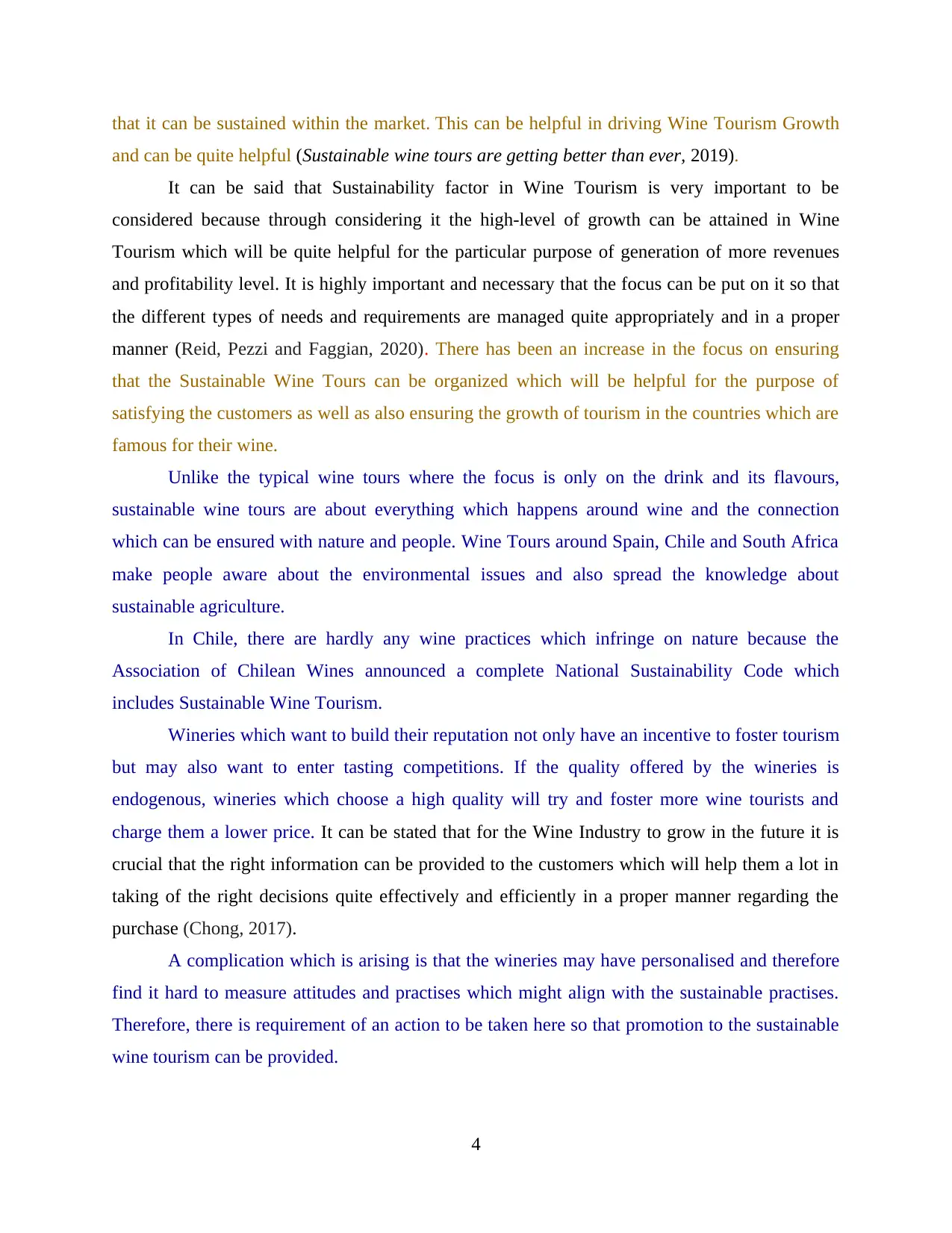
that it can be sustained within the market. This can be helpful in driving Wine Tourism Growth
and can be quite helpful (Sustainable wine tours are getting better than ever, 2019).
It can be said that Sustainability factor in Wine Tourism is very important to be
considered because through considering it the high-level of growth can be attained in Wine
Tourism which will be quite helpful for the particular purpose of generation of more revenues
and profitability level. It is highly important and necessary that the focus can be put on it so that
the different types of needs and requirements are managed quite appropriately and in a proper
manner (Reid, Pezzi and Faggian, 2020). There has been an increase in the focus on ensuring
that the Sustainable Wine Tours can be organized which will be helpful for the purpose of
satisfying the customers as well as also ensuring the growth of tourism in the countries which are
famous for their wine.
Unlike the typical wine tours where the focus is only on the drink and its flavours,
sustainable wine tours are about everything which happens around wine and the connection
which can be ensured with nature and people. Wine Tours around Spain, Chile and South Africa
make people aware about the environmental issues and also spread the knowledge about
sustainable agriculture.
In Chile, there are hardly any wine practices which infringe on nature because the
Association of Chilean Wines announced a complete National Sustainability Code which
includes Sustainable Wine Tourism.
Wineries which want to build their reputation not only have an incentive to foster tourism
but may also want to enter tasting competitions. If the quality offered by the wineries is
endogenous, wineries which choose a high quality will try and foster more wine tourists and
charge them a lower price. It can be stated that for the Wine Industry to grow in the future it is
crucial that the right information can be provided to the customers which will help them a lot in
taking of the right decisions quite effectively and efficiently in a proper manner regarding the
purchase (Chong, 2017).
A complication which is arising is that the wineries may have personalised and therefore
find it hard to measure attitudes and practises which might align with the sustainable practises.
Therefore, there is requirement of an action to be taken here so that promotion to the sustainable
wine tourism can be provided.
4
and can be quite helpful (Sustainable wine tours are getting better than ever, 2019).
It can be said that Sustainability factor in Wine Tourism is very important to be
considered because through considering it the high-level of growth can be attained in Wine
Tourism which will be quite helpful for the particular purpose of generation of more revenues
and profitability level. It is highly important and necessary that the focus can be put on it so that
the different types of needs and requirements are managed quite appropriately and in a proper
manner (Reid, Pezzi and Faggian, 2020). There has been an increase in the focus on ensuring
that the Sustainable Wine Tours can be organized which will be helpful for the purpose of
satisfying the customers as well as also ensuring the growth of tourism in the countries which are
famous for their wine.
Unlike the typical wine tours where the focus is only on the drink and its flavours,
sustainable wine tours are about everything which happens around wine and the connection
which can be ensured with nature and people. Wine Tours around Spain, Chile and South Africa
make people aware about the environmental issues and also spread the knowledge about
sustainable agriculture.
In Chile, there are hardly any wine practices which infringe on nature because the
Association of Chilean Wines announced a complete National Sustainability Code which
includes Sustainable Wine Tourism.
Wineries which want to build their reputation not only have an incentive to foster tourism
but may also want to enter tasting competitions. If the quality offered by the wineries is
endogenous, wineries which choose a high quality will try and foster more wine tourists and
charge them a lower price. It can be stated that for the Wine Industry to grow in the future it is
crucial that the right information can be provided to the customers which will help them a lot in
taking of the right decisions quite effectively and efficiently in a proper manner regarding the
purchase (Chong, 2017).
A complication which is arising is that the wineries may have personalised and therefore
find it hard to measure attitudes and practises which might align with the sustainable practises.
Therefore, there is requirement of an action to be taken here so that promotion to the sustainable
wine tourism can be provided.
4
⊘ This is a preview!⊘
Do you want full access?
Subscribe today to unlock all pages.

Trusted by 1+ million students worldwide
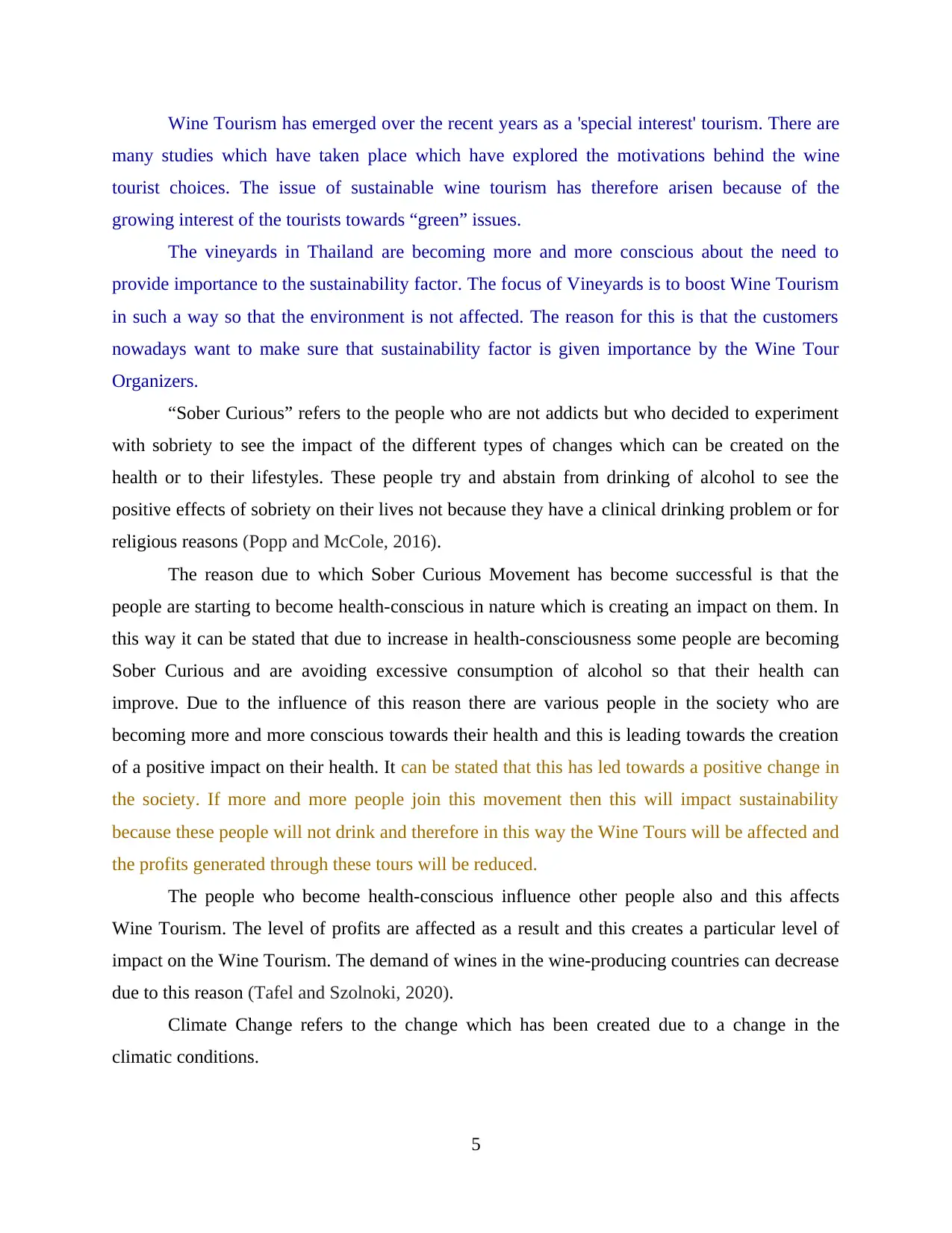
Wine Tourism has emerged over the recent years as a 'special interest' tourism. There are
many studies which have taken place which have explored the motivations behind the wine
tourist choices. The issue of sustainable wine tourism has therefore arisen because of the
growing interest of the tourists towards “green” issues.
The vineyards in Thailand are becoming more and more conscious about the need to
provide importance to the sustainability factor. The focus of Vineyards is to boost Wine Tourism
in such a way so that the environment is not affected. The reason for this is that the customers
nowadays want to make sure that sustainability factor is given importance by the Wine Tour
Organizers.
“Sober Curious” refers to the people who are not addicts but who decided to experiment
with sobriety to see the impact of the different types of changes which can be created on the
health or to their lifestyles. These people try and abstain from drinking of alcohol to see the
positive effects of sobriety on their lives not because they have a clinical drinking problem or for
religious reasons (Popp and McCole, 2016).
The reason due to which Sober Curious Movement has become successful is that the
people are starting to become health-conscious in nature which is creating an impact on them. In
this way it can be stated that due to increase in health-consciousness some people are becoming
Sober Curious and are avoiding excessive consumption of alcohol so that their health can
improve. Due to the influence of this reason there are various people in the society who are
becoming more and more conscious towards their health and this is leading towards the creation
of a positive impact on their health. It can be stated that this has led towards a positive change in
the society. If more and more people join this movement then this will impact sustainability
because these people will not drink and therefore in this way the Wine Tours will be affected and
the profits generated through these tours will be reduced.
The people who become health-conscious influence other people also and this affects
Wine Tourism. The level of profits are affected as a result and this creates a particular level of
impact on the Wine Tourism. The demand of wines in the wine-producing countries can decrease
due to this reason (Tafel and Szolnoki, 2020).
Climate Change refers to the change which has been created due to a change in the
climatic conditions.
5
many studies which have taken place which have explored the motivations behind the wine
tourist choices. The issue of sustainable wine tourism has therefore arisen because of the
growing interest of the tourists towards “green” issues.
The vineyards in Thailand are becoming more and more conscious about the need to
provide importance to the sustainability factor. The focus of Vineyards is to boost Wine Tourism
in such a way so that the environment is not affected. The reason for this is that the customers
nowadays want to make sure that sustainability factor is given importance by the Wine Tour
Organizers.
“Sober Curious” refers to the people who are not addicts but who decided to experiment
with sobriety to see the impact of the different types of changes which can be created on the
health or to their lifestyles. These people try and abstain from drinking of alcohol to see the
positive effects of sobriety on their lives not because they have a clinical drinking problem or for
religious reasons (Popp and McCole, 2016).
The reason due to which Sober Curious Movement has become successful is that the
people are starting to become health-conscious in nature which is creating an impact on them. In
this way it can be stated that due to increase in health-consciousness some people are becoming
Sober Curious and are avoiding excessive consumption of alcohol so that their health can
improve. Due to the influence of this reason there are various people in the society who are
becoming more and more conscious towards their health and this is leading towards the creation
of a positive impact on their health. It can be stated that this has led towards a positive change in
the society. If more and more people join this movement then this will impact sustainability
because these people will not drink and therefore in this way the Wine Tours will be affected and
the profits generated through these tours will be reduced.
The people who become health-conscious influence other people also and this affects
Wine Tourism. The level of profits are affected as a result and this creates a particular level of
impact on the Wine Tourism. The demand of wines in the wine-producing countries can decrease
due to this reason (Tafel and Szolnoki, 2020).
Climate Change refers to the change which has been created due to a change in the
climatic conditions.
5
Paraphrase This Document
Need a fresh take? Get an instant paraphrase of this document with our AI Paraphraser
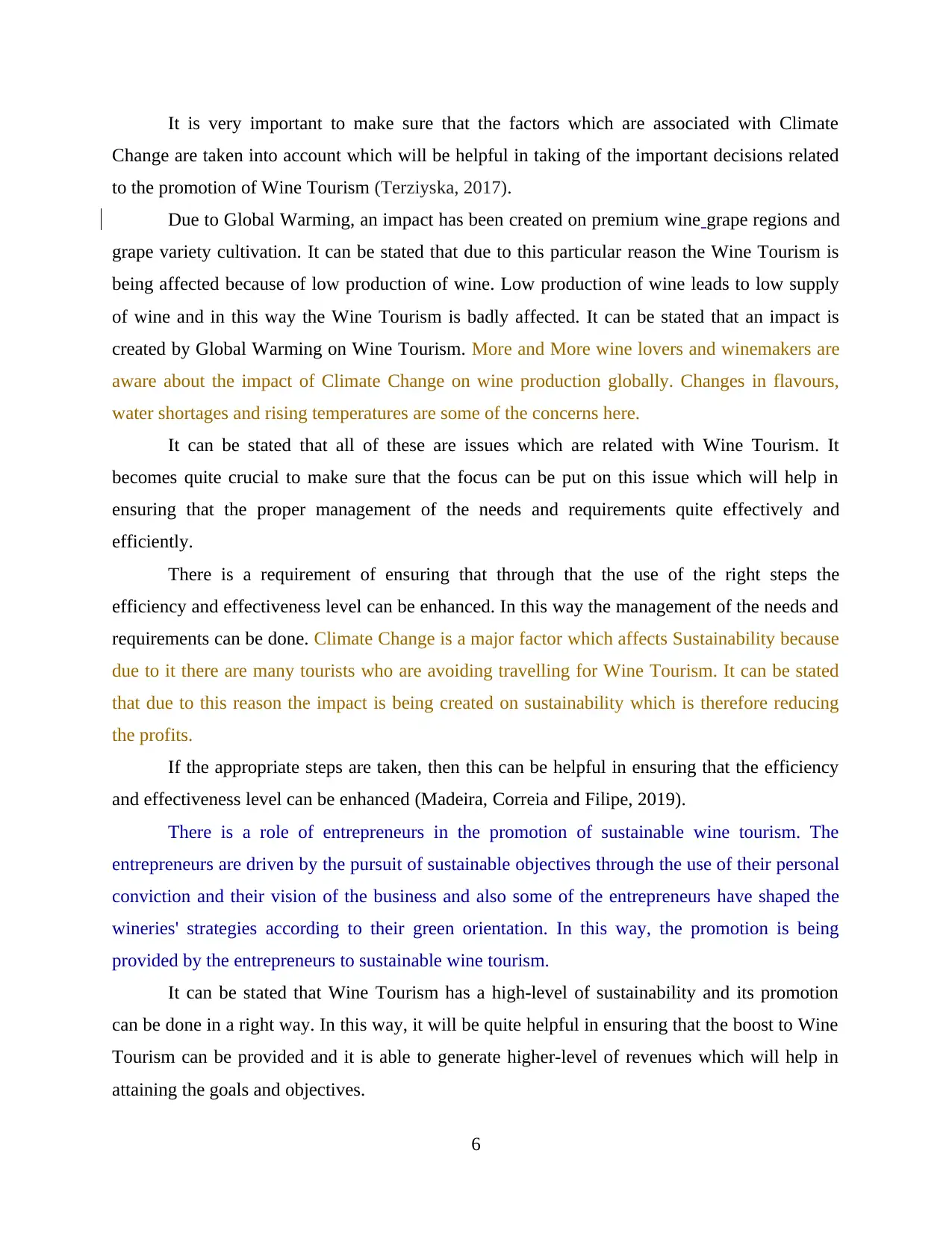
It is very important to make sure that the factors which are associated with Climate
Change are taken into account which will be helpful in taking of the important decisions related
to the promotion of Wine Tourism (Terziyska, 2017).
Due to Global Warming, an impact has been created on premium wine grape regions and
grape variety cultivation. It can be stated that due to this particular reason the Wine Tourism is
being affected because of low production of wine. Low production of wine leads to low supply
of wine and in this way the Wine Tourism is badly affected. It can be stated that an impact is
created by Global Warming on Wine Tourism. More and More wine lovers and winemakers are
aware about the impact of Climate Change on wine production globally. Changes in flavours,
water shortages and rising temperatures are some of the concerns here.
It can be stated that all of these are issues which are related with Wine Tourism. It
becomes quite crucial to make sure that the focus can be put on this issue which will help in
ensuring that the proper management of the needs and requirements quite effectively and
efficiently.
There is a requirement of ensuring that through that the use of the right steps the
efficiency and effectiveness level can be enhanced. In this way the management of the needs and
requirements can be done. Climate Change is a major factor which affects Sustainability because
due to it there are many tourists who are avoiding travelling for Wine Tourism. It can be stated
that due to this reason the impact is being created on sustainability which is therefore reducing
the profits.
If the appropriate steps are taken, then this can be helpful in ensuring that the efficiency
and effectiveness level can be enhanced (Madeira, Correia and Filipe, 2019).
There is a role of entrepreneurs in the promotion of sustainable wine tourism. The
entrepreneurs are driven by the pursuit of sustainable objectives through the use of their personal
conviction and their vision of the business and also some of the entrepreneurs have shaped the
wineries' strategies according to their green orientation. In this way, the promotion is being
provided by the entrepreneurs to sustainable wine tourism.
It can be stated that Wine Tourism has a high-level of sustainability and its promotion
can be done in a right way. In this way, it will be quite helpful in ensuring that the boost to Wine
Tourism can be provided and it is able to generate higher-level of revenues which will help in
attaining the goals and objectives.
6
Change are taken into account which will be helpful in taking of the important decisions related
to the promotion of Wine Tourism (Terziyska, 2017).
Due to Global Warming, an impact has been created on premium wine grape regions and
grape variety cultivation. It can be stated that due to this particular reason the Wine Tourism is
being affected because of low production of wine. Low production of wine leads to low supply
of wine and in this way the Wine Tourism is badly affected. It can be stated that an impact is
created by Global Warming on Wine Tourism. More and More wine lovers and winemakers are
aware about the impact of Climate Change on wine production globally. Changes in flavours,
water shortages and rising temperatures are some of the concerns here.
It can be stated that all of these are issues which are related with Wine Tourism. It
becomes quite crucial to make sure that the focus can be put on this issue which will help in
ensuring that the proper management of the needs and requirements quite effectively and
efficiently.
There is a requirement of ensuring that through that the use of the right steps the
efficiency and effectiveness level can be enhanced. In this way the management of the needs and
requirements can be done. Climate Change is a major factor which affects Sustainability because
due to it there are many tourists who are avoiding travelling for Wine Tourism. It can be stated
that due to this reason the impact is being created on sustainability which is therefore reducing
the profits.
If the appropriate steps are taken, then this can be helpful in ensuring that the efficiency
and effectiveness level can be enhanced (Madeira, Correia and Filipe, 2019).
There is a role of entrepreneurs in the promotion of sustainable wine tourism. The
entrepreneurs are driven by the pursuit of sustainable objectives through the use of their personal
conviction and their vision of the business and also some of the entrepreneurs have shaped the
wineries' strategies according to their green orientation. In this way, the promotion is being
provided by the entrepreneurs to sustainable wine tourism.
It can be stated that Wine Tourism has a high-level of sustainability and its promotion
can be done in a right way. In this way, it will be quite helpful in ensuring that the boost to Wine
Tourism can be provided and it is able to generate higher-level of revenues which will help in
attaining the goals and objectives.
6
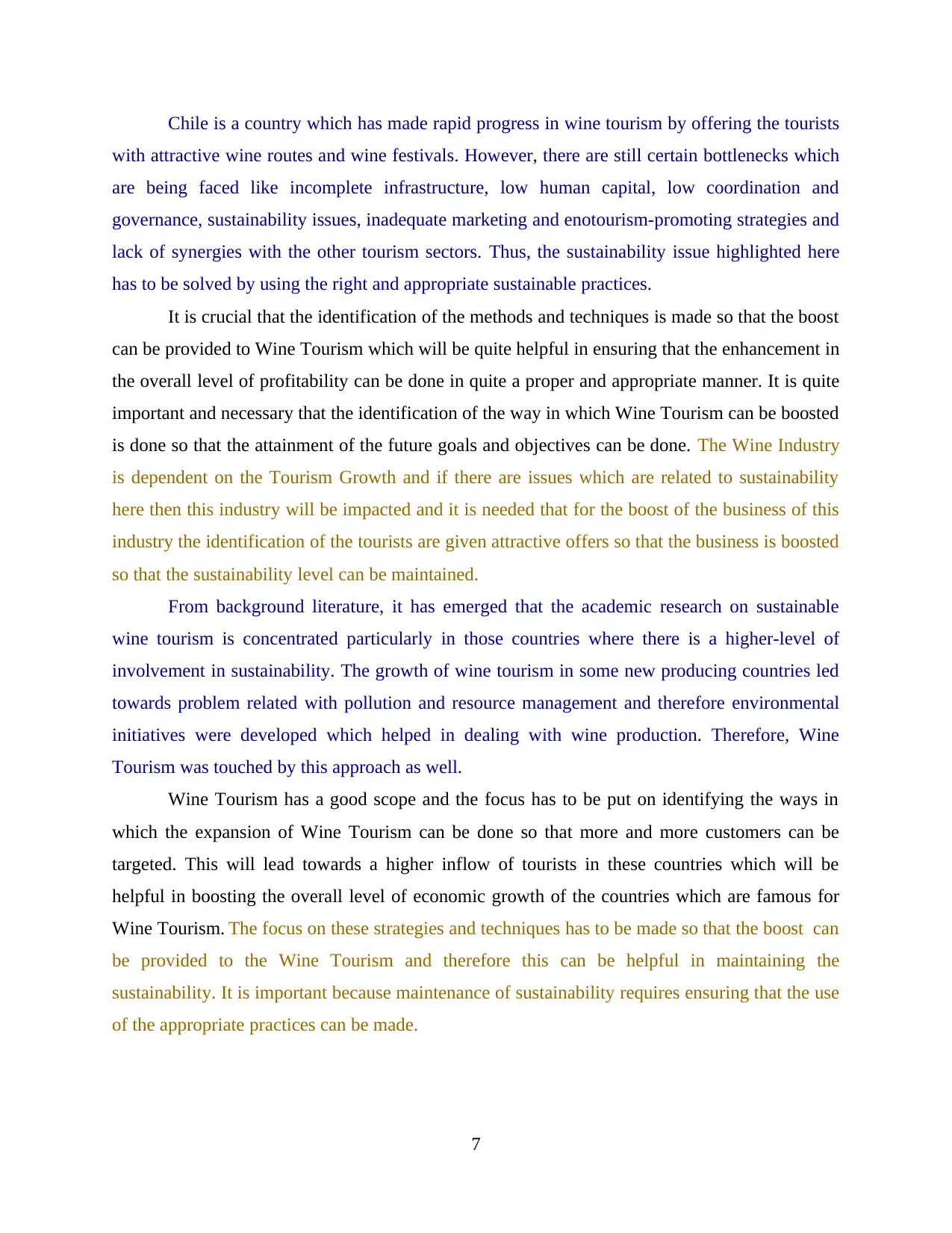
Chile is a country which has made rapid progress in wine tourism by offering the tourists
with attractive wine routes and wine festivals. However, there are still certain bottlenecks which
are being faced like incomplete infrastructure, low human capital, low coordination and
governance, sustainability issues, inadequate marketing and enotourism-promoting strategies and
lack of synergies with the other tourism sectors. Thus, the sustainability issue highlighted here
has to be solved by using the right and appropriate sustainable practices.
It is crucial that the identification of the methods and techniques is made so that the boost
can be provided to Wine Tourism which will be quite helpful in ensuring that the enhancement in
the overall level of profitability can be done in quite a proper and appropriate manner. It is quite
important and necessary that the identification of the way in which Wine Tourism can be boosted
is done so that the attainment of the future goals and objectives can be done. The Wine Industry
is dependent on the Tourism Growth and if there are issues which are related to sustainability
here then this industry will be impacted and it is needed that for the boost of the business of this
industry the identification of the tourists are given attractive offers so that the business is boosted
so that the sustainability level can be maintained.
From background literature, it has emerged that the academic research on sustainable
wine tourism is concentrated particularly in those countries where there is a higher-level of
involvement in sustainability. The growth of wine tourism in some new producing countries led
towards problem related with pollution and resource management and therefore environmental
initiatives were developed which helped in dealing with wine production. Therefore, Wine
Tourism was touched by this approach as well.
Wine Tourism has a good scope and the focus has to be put on identifying the ways in
which the expansion of Wine Tourism can be done so that more and more customers can be
targeted. This will lead towards a higher inflow of tourists in these countries which will be
helpful in boosting the overall level of economic growth of the countries which are famous for
Wine Tourism. The focus on these strategies and techniques has to be made so that the boost can
be provided to the Wine Tourism and therefore this can be helpful in maintaining the
sustainability. It is important because maintenance of sustainability requires ensuring that the use
of the appropriate practices can be made.
7
with attractive wine routes and wine festivals. However, there are still certain bottlenecks which
are being faced like incomplete infrastructure, low human capital, low coordination and
governance, sustainability issues, inadequate marketing and enotourism-promoting strategies and
lack of synergies with the other tourism sectors. Thus, the sustainability issue highlighted here
has to be solved by using the right and appropriate sustainable practices.
It is crucial that the identification of the methods and techniques is made so that the boost
can be provided to Wine Tourism which will be quite helpful in ensuring that the enhancement in
the overall level of profitability can be done in quite a proper and appropriate manner. It is quite
important and necessary that the identification of the way in which Wine Tourism can be boosted
is done so that the attainment of the future goals and objectives can be done. The Wine Industry
is dependent on the Tourism Growth and if there are issues which are related to sustainability
here then this industry will be impacted and it is needed that for the boost of the business of this
industry the identification of the tourists are given attractive offers so that the business is boosted
so that the sustainability level can be maintained.
From background literature, it has emerged that the academic research on sustainable
wine tourism is concentrated particularly in those countries where there is a higher-level of
involvement in sustainability. The growth of wine tourism in some new producing countries led
towards problem related with pollution and resource management and therefore environmental
initiatives were developed which helped in dealing with wine production. Therefore, Wine
Tourism was touched by this approach as well.
Wine Tourism has a good scope and the focus has to be put on identifying the ways in
which the expansion of Wine Tourism can be done so that more and more customers can be
targeted. This will lead towards a higher inflow of tourists in these countries which will be
helpful in boosting the overall level of economic growth of the countries which are famous for
Wine Tourism. The focus on these strategies and techniques has to be made so that the boost can
be provided to the Wine Tourism and therefore this can be helpful in maintaining the
sustainability. It is important because maintenance of sustainability requires ensuring that the use
of the appropriate practices can be made.
7
⊘ This is a preview!⊘
Do you want full access?
Subscribe today to unlock all pages.

Trusted by 1+ million students worldwide
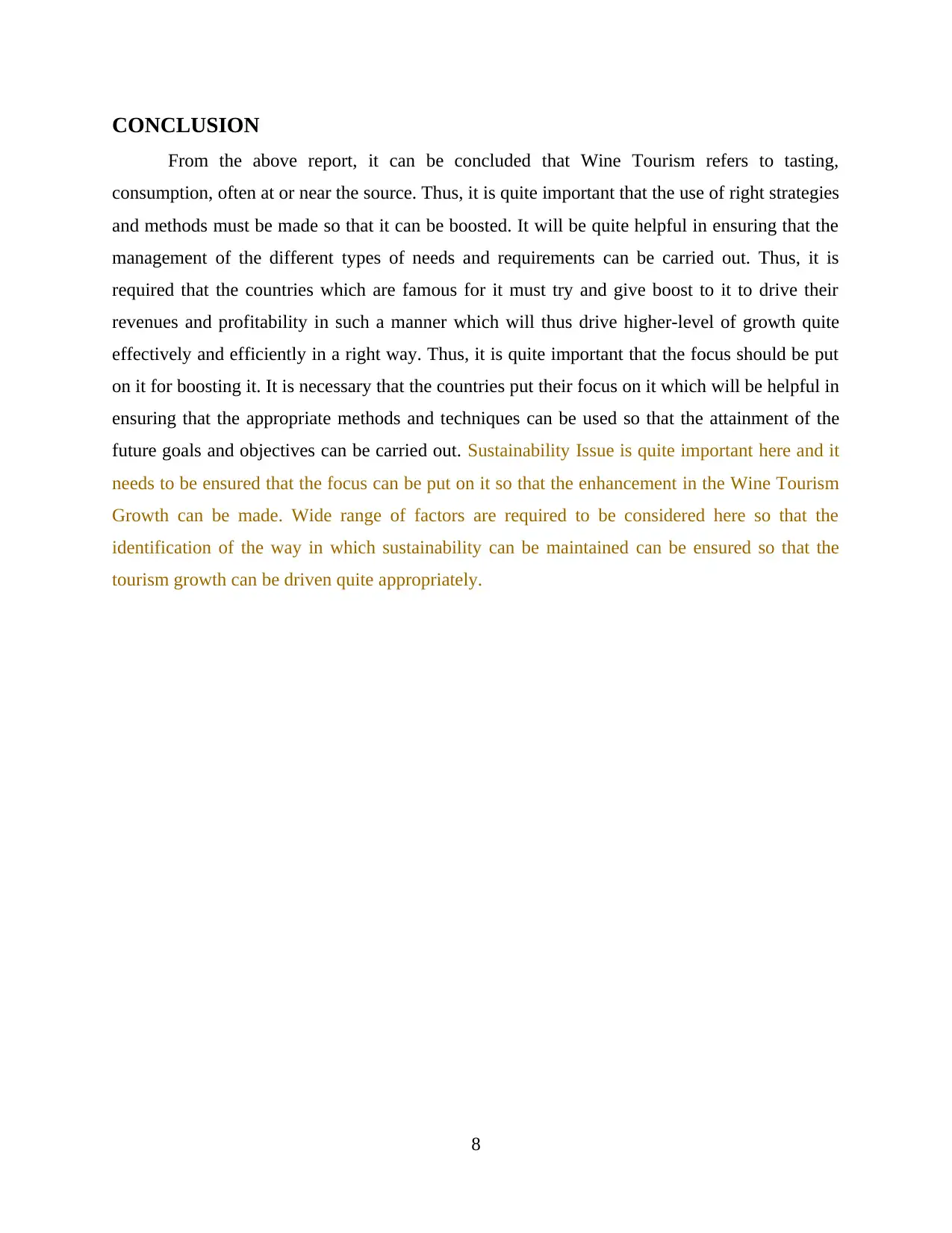
CONCLUSION
From the above report, it can be concluded that Wine Tourism refers to tasting,
consumption, often at or near the source. Thus, it is quite important that the use of right strategies
and methods must be made so that it can be boosted. It will be quite helpful in ensuring that the
management of the different types of needs and requirements can be carried out. Thus, it is
required that the countries which are famous for it must try and give boost to it to drive their
revenues and profitability in such a manner which will thus drive higher-level of growth quite
effectively and efficiently in a right way. Thus, it is quite important that the focus should be put
on it for boosting it. It is necessary that the countries put their focus on it which will be helpful in
ensuring that the appropriate methods and techniques can be used so that the attainment of the
future goals and objectives can be carried out. Sustainability Issue is quite important here and it
needs to be ensured that the focus can be put on it so that the enhancement in the Wine Tourism
Growth can be made. Wide range of factors are required to be considered here so that the
identification of the way in which sustainability can be maintained can be ensured so that the
tourism growth can be driven quite appropriately.
8
From the above report, it can be concluded that Wine Tourism refers to tasting,
consumption, often at or near the source. Thus, it is quite important that the use of right strategies
and methods must be made so that it can be boosted. It will be quite helpful in ensuring that the
management of the different types of needs and requirements can be carried out. Thus, it is
required that the countries which are famous for it must try and give boost to it to drive their
revenues and profitability in such a manner which will thus drive higher-level of growth quite
effectively and efficiently in a right way. Thus, it is quite important that the focus should be put
on it for boosting it. It is necessary that the countries put their focus on it which will be helpful in
ensuring that the appropriate methods and techniques can be used so that the attainment of the
future goals and objectives can be carried out. Sustainability Issue is quite important here and it
needs to be ensured that the focus can be put on it so that the enhancement in the Wine Tourism
Growth can be made. Wide range of factors are required to be considered here so that the
identification of the way in which sustainability can be maintained can be ensured so that the
tourism growth can be driven quite appropriately.
8
Paraphrase This Document
Need a fresh take? Get an instant paraphrase of this document with our AI Paraphraser
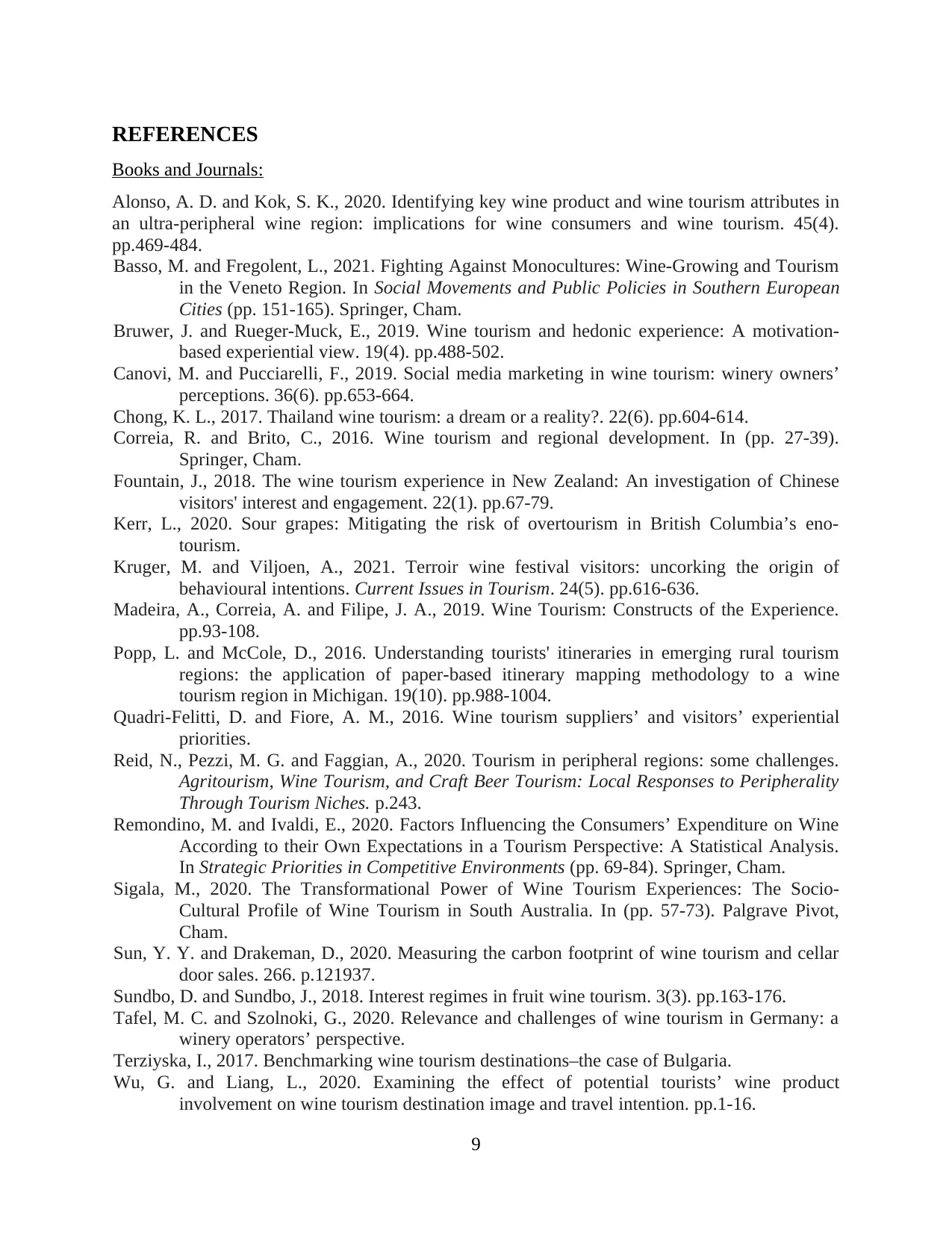
REFERENCES
Books and Journals:
Alonso, A. D. and Kok, S. K., 2020. Identifying key wine product and wine tourism attributes in
an ultra-peripheral wine region: implications for wine consumers and wine tourism. 45(4).
pp.469-484.
Basso, M. and Fregolent, L., 2021. Fighting Against Monocultures: Wine-Growing and Tourism
in the Veneto Region. In Social Movements and Public Policies in Southern European
Cities (pp. 151-165). Springer, Cham.
Bruwer, J. and Rueger-Muck, E., 2019. Wine tourism and hedonic experience: A motivation-
based experiential view. 19(4). pp.488-502.
Canovi, M. and Pucciarelli, F., 2019. Social media marketing in wine tourism: winery owners’
perceptions. 36(6). pp.653-664.
Chong, K. L., 2017. Thailand wine tourism: a dream or a reality?. 22(6). pp.604-614.
Correia, R. and Brito, C., 2016. Wine tourism and regional development. In (pp. 27-39).
Springer, Cham.
Fountain, J., 2018. The wine tourism experience in New Zealand: An investigation of Chinese
visitors' interest and engagement. 22(1). pp.67-79.
Kerr, L., 2020. Sour grapes: Mitigating the risk of overtourism in British Columbia’s eno-
tourism.
Kruger, M. and Viljoen, A., 2021. Terroir wine festival visitors: uncorking the origin of
behavioural intentions. Current Issues in Tourism. 24(5). pp.616-636.
Madeira, A., Correia, A. and Filipe, J. A., 2019. Wine Tourism: Constructs of the Experience.
pp.93-108.
Popp, L. and McCole, D., 2016. Understanding tourists' itineraries in emerging rural tourism
regions: the application of paper-based itinerary mapping methodology to a wine
tourism region in Michigan. 19(10). pp.988-1004.
Quadri-Felitti, D. and Fiore, A. M., 2016. Wine tourism suppliers’ and visitors’ experiential
priorities.
Reid, N., Pezzi, M. G. and Faggian, A., 2020. Tourism in peripheral regions: some challenges.
Agritourism, Wine Tourism, and Craft Beer Tourism: Local Responses to Peripherality
Through Tourism Niches. p.243.
Remondino, M. and Ivaldi, E., 2020. Factors Influencing the Consumers’ Expenditure on Wine
According to their Own Expectations in a Tourism Perspective: A Statistical Analysis.
In Strategic Priorities in Competitive Environments (pp. 69-84). Springer, Cham.
Sigala, M., 2020. The Transformational Power of Wine Tourism Experiences: The Socio-
Cultural Profile of Wine Tourism in South Australia. In (pp. 57-73). Palgrave Pivot,
Cham.
Sun, Y. Y. and Drakeman, D., 2020. Measuring the carbon footprint of wine tourism and cellar
door sales. 266. p.121937.
Sundbo, D. and Sundbo, J., 2018. Interest regimes in fruit wine tourism. 3(3). pp.163-176.
Tafel, M. C. and Szolnoki, G., 2020. Relevance and challenges of wine tourism in Germany: a
winery operators’ perspective.
Terziyska, I., 2017. Benchmarking wine tourism destinations–the case of Bulgaria.
Wu, G. and Liang, L., 2020. Examining the effect of potential tourists’ wine product
involvement on wine tourism destination image and travel intention. pp.1-16.
9
Books and Journals:
Alonso, A. D. and Kok, S. K., 2020. Identifying key wine product and wine tourism attributes in
an ultra-peripheral wine region: implications for wine consumers and wine tourism. 45(4).
pp.469-484.
Basso, M. and Fregolent, L., 2021. Fighting Against Monocultures: Wine-Growing and Tourism
in the Veneto Region. In Social Movements and Public Policies in Southern European
Cities (pp. 151-165). Springer, Cham.
Bruwer, J. and Rueger-Muck, E., 2019. Wine tourism and hedonic experience: A motivation-
based experiential view. 19(4). pp.488-502.
Canovi, M. and Pucciarelli, F., 2019. Social media marketing in wine tourism: winery owners’
perceptions. 36(6). pp.653-664.
Chong, K. L., 2017. Thailand wine tourism: a dream or a reality?. 22(6). pp.604-614.
Correia, R. and Brito, C., 2016. Wine tourism and regional development. In (pp. 27-39).
Springer, Cham.
Fountain, J., 2018. The wine tourism experience in New Zealand: An investigation of Chinese
visitors' interest and engagement. 22(1). pp.67-79.
Kerr, L., 2020. Sour grapes: Mitigating the risk of overtourism in British Columbia’s eno-
tourism.
Kruger, M. and Viljoen, A., 2021. Terroir wine festival visitors: uncorking the origin of
behavioural intentions. Current Issues in Tourism. 24(5). pp.616-636.
Madeira, A., Correia, A. and Filipe, J. A., 2019. Wine Tourism: Constructs of the Experience.
pp.93-108.
Popp, L. and McCole, D., 2016. Understanding tourists' itineraries in emerging rural tourism
regions: the application of paper-based itinerary mapping methodology to a wine
tourism region in Michigan. 19(10). pp.988-1004.
Quadri-Felitti, D. and Fiore, A. M., 2016. Wine tourism suppliers’ and visitors’ experiential
priorities.
Reid, N., Pezzi, M. G. and Faggian, A., 2020. Tourism in peripheral regions: some challenges.
Agritourism, Wine Tourism, and Craft Beer Tourism: Local Responses to Peripherality
Through Tourism Niches. p.243.
Remondino, M. and Ivaldi, E., 2020. Factors Influencing the Consumers’ Expenditure on Wine
According to their Own Expectations in a Tourism Perspective: A Statistical Analysis.
In Strategic Priorities in Competitive Environments (pp. 69-84). Springer, Cham.
Sigala, M., 2020. The Transformational Power of Wine Tourism Experiences: The Socio-
Cultural Profile of Wine Tourism in South Australia. In (pp. 57-73). Palgrave Pivot,
Cham.
Sun, Y. Y. and Drakeman, D., 2020. Measuring the carbon footprint of wine tourism and cellar
door sales. 266. p.121937.
Sundbo, D. and Sundbo, J., 2018. Interest regimes in fruit wine tourism. 3(3). pp.163-176.
Tafel, M. C. and Szolnoki, G., 2020. Relevance and challenges of wine tourism in Germany: a
winery operators’ perspective.
Terziyska, I., 2017. Benchmarking wine tourism destinations–the case of Bulgaria.
Wu, G. and Liang, L., 2020. Examining the effect of potential tourists’ wine product
involvement on wine tourism destination image and travel intention. pp.1-16.
9
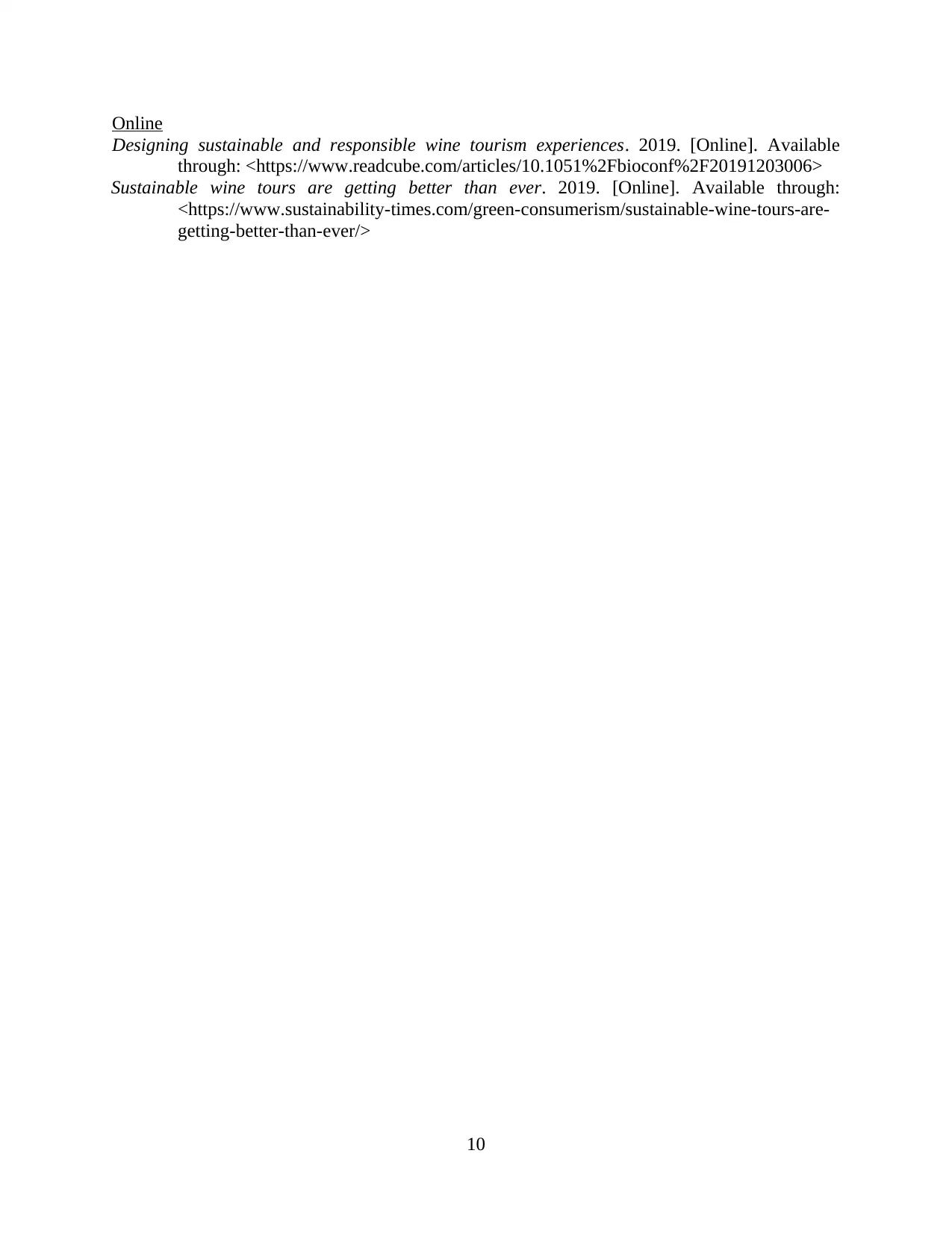
Online
Designing sustainable and responsible wine tourism experiences. 2019. [Online]. Available
through: <https://www.readcube.com/articles/10.1051%2Fbioconf%2F20191203006>
Sustainable wine tours are getting better than ever. 2019. [Online]. Available through:
<https://www.sustainability-times.com/green-consumerism/sustainable-wine-tours-are-
getting-better-than-ever/>
10
Designing sustainable and responsible wine tourism experiences. 2019. [Online]. Available
through: <https://www.readcube.com/articles/10.1051%2Fbioconf%2F20191203006>
Sustainable wine tours are getting better than ever. 2019. [Online]. Available through:
<https://www.sustainability-times.com/green-consumerism/sustainable-wine-tours-are-
getting-better-than-ever/>
10
⊘ This is a preview!⊘
Do you want full access?
Subscribe today to unlock all pages.

Trusted by 1+ million students worldwide
1 out of 12
Related Documents
Your All-in-One AI-Powered Toolkit for Academic Success.
+13062052269
info@desklib.com
Available 24*7 on WhatsApp / Email
![[object Object]](/_next/static/media/star-bottom.7253800d.svg)
Unlock your academic potential
Copyright © 2020–2026 A2Z Services. All Rights Reserved. Developed and managed by ZUCOL.





